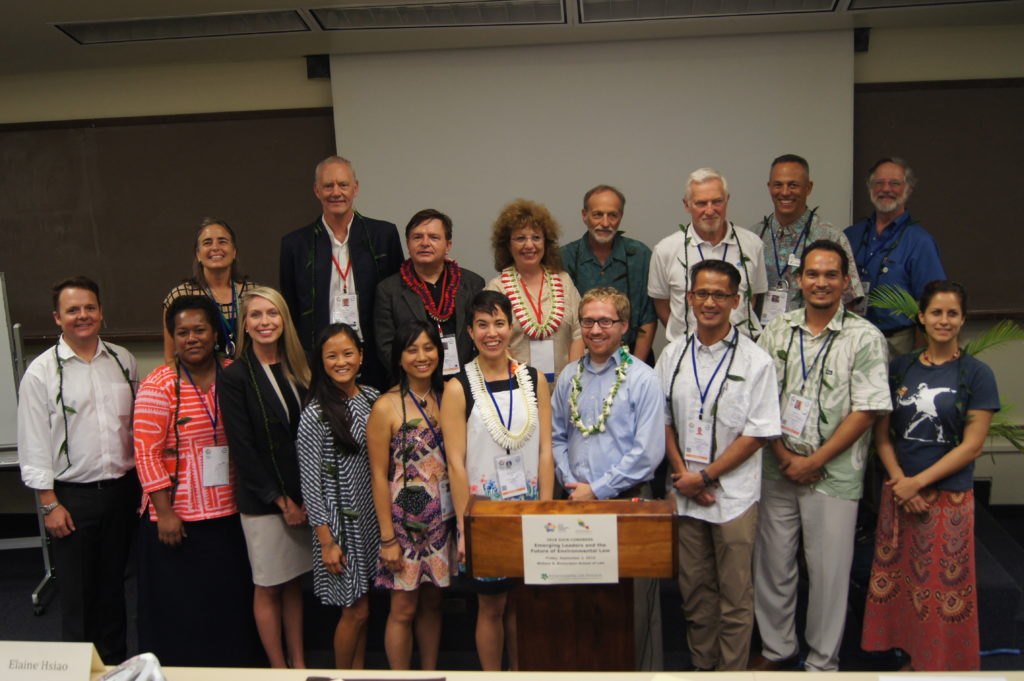The Future of Environmental Law?
Thoughts from the IUCN World Conservation Congress in Hawai’i
I am writing this weekend from a sunny spot in the Pacific, from the IUCN World Conservation Congress in Honolulu. For the uninitiated, the IUCN—International Union for Conservation of Nature and Natural Resources—is a global union of governments and non-governmental organizations (including over 1300 member institutions, organizations, and countries worldwide) focused on the conservation of nature. The IUCN holds its worldwide meeting, the World Conservation Congress, once every four years. For the first time, the WCC is being held in the United States, in Honolulu. I have been involved in the planning of several events in connection with the Congress this weekend.

Last night, my colleague Michelle Lim and I co-organized a special workshop on Emerging Leaders and the Future of Environmental Law, graciously hosted by the University of Hawai‘i William H. Richardson School of Law and co-sponsored by the IUCN World Commission on Environmental Law. The event was a vibrant, inter-generational gathering of judges, attorneys, and students from a variety of countries and backgrounds. In order to hear from as many voices as possible, we asked speakers to compress their remarks to 3 minutes and address a set of questions, focused on describing a particular environmental challenge and describing a specific suggestion or proposal for the role of environmental law in creating a sustainable future and for engaging a new generation of leaders in environmental law.

Some of the main themes that emerged were how legal systems often fail to allow marginalized voices to be heard, and that there is a great need to work with communities, and learn from past experiences and traditional knowledge about human interactions with the environment. In the face of great social, economic, and environmental challenges, there is a need for inter-generational engagement on how to reform law, making it a tool for collaboration and connection for environmental protection and sustainability, rather than conflict.
Today, at a larger session at the IUCN Congress on engaging a new generation for conservation, Jane Goodall spoke, admonishing each of us in the audience to “think about the consequences of the small daily choices you make” and their impact on the environment. My hope is that over the next generation, we can think more effectively about how legal systems, environmental laws and policies can encourage this kind of consciousness and motivate us to change our collective unsustainable behavior as well.
Reader Comments
6 Replies to “The Future of Environmental Law?”
Comments are closed.






Dear Nicholas,
The next generation of environmental professionals should know that the old methodologies of junk science, public lies and hysterical nonsense must be abandoned. They should be taught and encouraged to uphold rigorous scientific proof, ethical behavior, honesty and integrity when dealing with environmental issues and the public. Given the sorry state of modern environmentalism this will not be an easy task. A renewed emphasis on personal and professional ethics is the best path forward for the next generation of environmental leaders.
When I think back on the first environmental law conference I helped organized in 1969, it was marked by bi-partisan representation, because environmental conservation and policy were appreciated by leaders in both parties — yes, including Nixon, for pragmatic reasons. We suffer greatly from the loss of that today at the national and state levels. Climate deniers are largely Republican. It’s all a giant step backward.
We also need to bring environmental economics into the forefront of our thinking and our laws. That will greatly help bridge the political gap if done with care.
Malcolm said;
“….Climate deniers are largely Republican.,,,”
Dear Malcolm,
As you know, we “deniers” correctly understand that it is not technically feasible to regulate, control or mitigate the global climate by employing solar panels, wind turbines and other forms of renewable energy projects. We recognize that such schemes do not effectively reduce atmospheric carbon dioxide levels. There is absolutely no conclusive scientific proof to substantiate the efficacy of such measures.
The modern environmental movement abhors truth, promotes deception, and teaches young people to practice malice and pursue a livelihood that is characterized by contempt for truth.
Conversely, we “deniers” encourage young people to live a moral life, love truth and earn respect based on intellectual honesty and personal integrity. Do the right thing and steer clear of modern environmentalism and its evil corruption.
One comment reads: “— we “deniers” encourage young people to live a moral life, love truth and earn respect based on intellectual honesty and personal integrity. Do the right thing and steer clear of modern environmentalism and its evil corruption.”
That kind of propaganda statement would make Goebbels proud of him for following his motto: “If you tell a lie big enough and keep repeating it, people will eventually come to believe it.”
That kind of propaganda destroyed WWII Germany along with most of Europe, and can destroy the human race if intellectuals continue to fail to educate and motivate peoples to protect our planet from accelerating global warming conditions we are failing to control today.
Mapping global temperature change
http://www.climate-lab-book.ac.uk/2016/mapping-global-temperature-change/
.
Anthony said;
“….. can destroy the human race if intellectuals continue to fail to educate and motivate peoples to protect our planet from accelerating global warming conditions…..”
Dear Anthony,
You consistently remind us that so-called “intellectuals” (in California) are not doing their job. Well it’s not up to them, it’s up to Hillary. She is the one who must motivate people to protect the planet from global warming, but she is not doing the job.
Sorry, there is no one to protect us. Deniers hold the truth, we don’t need protection. Don’t waste what little time you have left in this life fussing over climate. Study the Bible and prepare your soul. Have a good day.
I refuse to believe that God created us only to allow us to commit suicide, but current events prove that both deniers and intellectuals are causing that to happen because we refuse to join together to fight for survival like we did during WWII.
Tragically, the root cause of our ultimate failure really does appear to be:
http://alumni.berkeley.edu/california-magazine/september-october-2006-global-warning/can-we-adapt-time